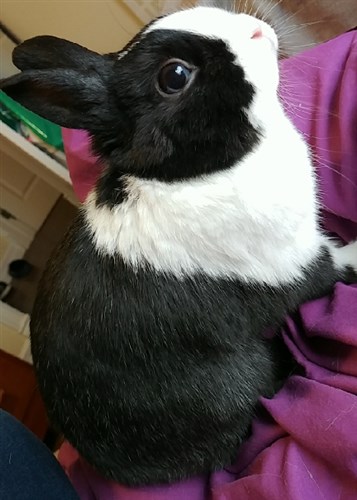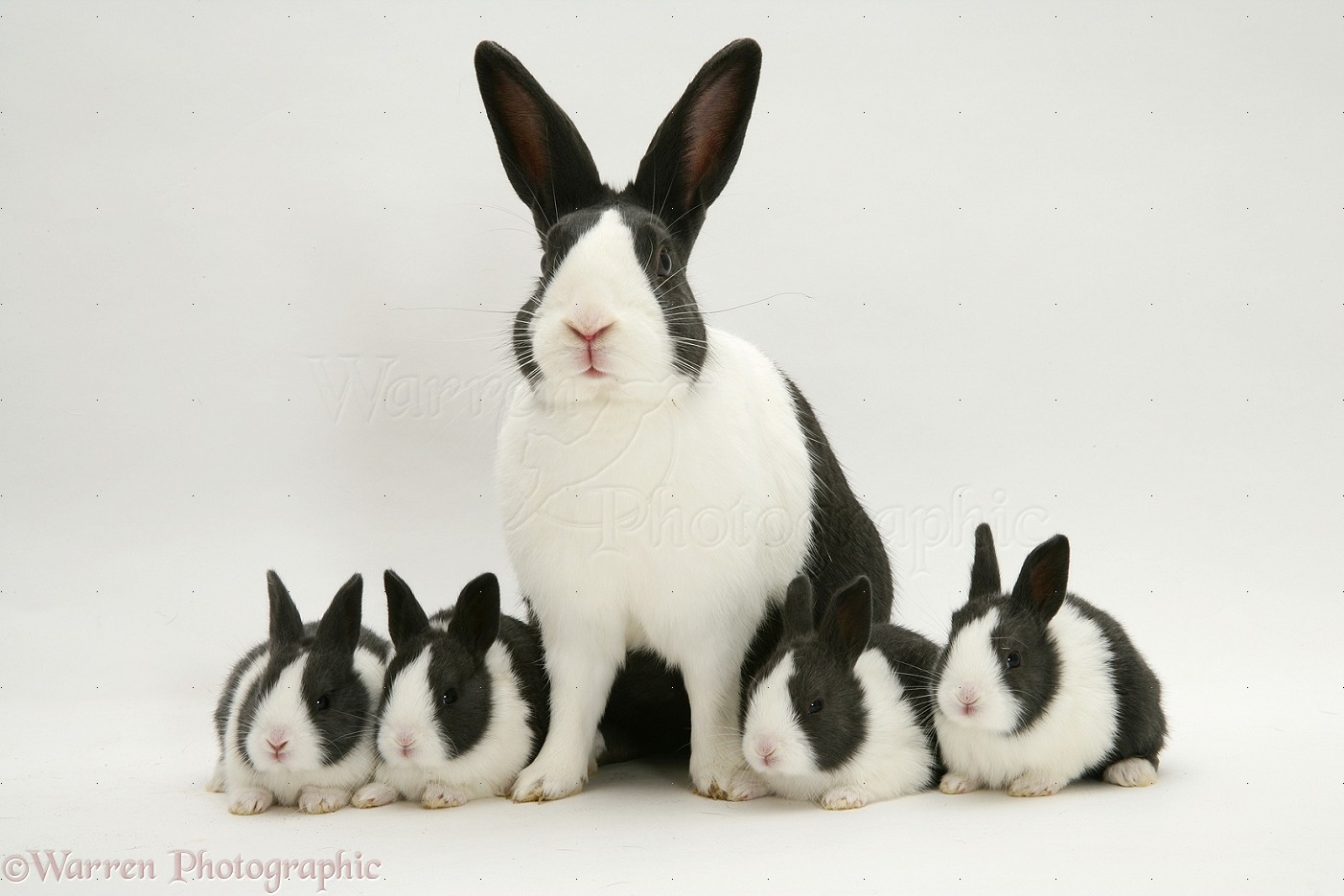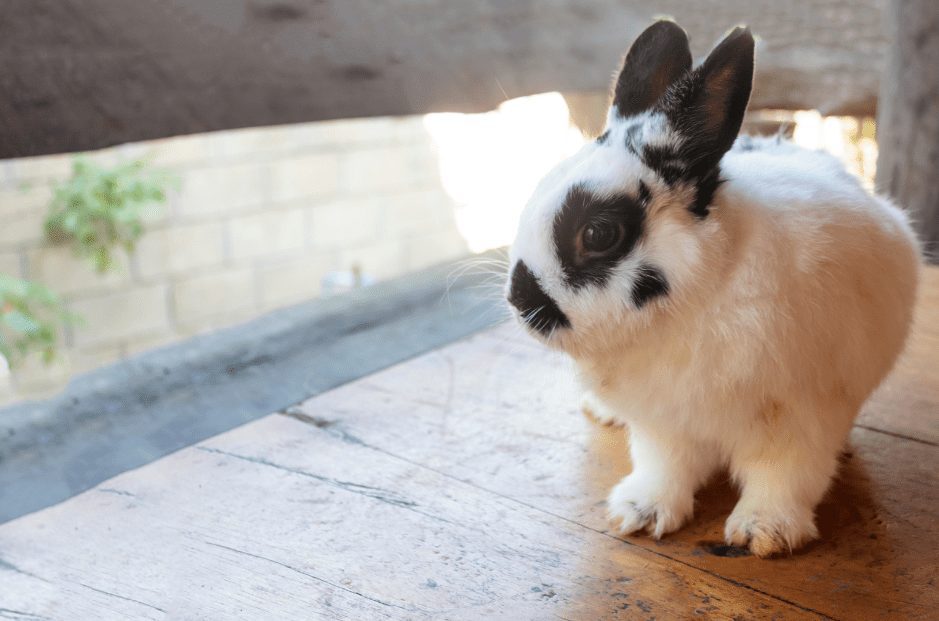Key Takeaways
- Dutch rabbits typically live 5-10 years, while Netherland Dwarfs can live up to 12 years with proper care.
- Both breeds are intelligent and can be trained to use a litter box.
- Dutch rabbits are generally larger, weighing 3.5-5.5 pounds, while Netherland Dwarfs weigh around 2 pounds.
- Netherland Dwarfs are more active and may require more space to play.
- Choosing the right rabbit depends on your lifestyle, space, and commitment to care.
Choosing the Right Rabbit Breed: Dutch vs. Netherland Dwarf
When considering adopting a rabbit, it’s important to choose the breed that best fits your lifestyle and living situation. Both Dutch and Netherland Dwarf rabbits make wonderful pets, but they have distinct characteristics and care needs. Understanding these differences can help ensure a happy, healthy life for your furry friend and bring joy to your home.

“Dutch or dwarf? | BinkyBunny” from binkybunny.com and used with no modifications.
Overview of Dutch and Netherland Dwarf Rabbits
Let’s start by getting to know these two popular breeds a bit better. Dutch rabbits are known for their distinctive markings and friendly nature. They are a medium-sized breed, often weighing between 3.5 and 5.5 pounds. On the other hand, Netherland Dwarfs are one of the smallest rabbit breeds, weighing around 2 pounds. Despite their size, they pack a punch in terms of personality and energy.
“Dutch rabbits are gentle and can get along with other pets, while Netherland Dwarfs have more delicate digestive systems due to their small size.”
Factors to Consider When Adopting a Rabbit
Adopting a rabbit is a long-term commitment, so it’s crucial to consider various factors before making a decision. Here are some key points to keep in mind:
- Space: Ensure you have enough room for the rabbit to move and play. Netherland Dwarfs may require more playtime due to their energetic nature.
- Time: Rabbits need daily interaction and care. Are you ready for this responsibility?
- Companionship: Both breeds thrive on social interaction, whether with humans or other rabbits.
- Diet: A proper diet is essential for their health. Fresh hay, vegetables, and pellets are necessary.

“Blue Dutch rabbits photo WP10609” from www.warrenphotographic.co.uk and used with no modifications.
Characteristics of Dutch Rabbits
Now that we have a basic understanding of both breeds, let’s dive deeper into the characteristics of Dutch rabbits. These rabbits are often chosen for their calm demeanor and striking appearance.
Physical Description and Size
Dutch rabbits are medium-sized and have a compact, well-rounded body. They are easily recognizable by their unique color pattern, which usually includes a white body with distinct patches of color on their cheeks and hindquarters. This striking look makes them a favorite among rabbit enthusiasts. For those considering adding a rabbit to their family, it’s important to understand the advantages of adopting rabbits and other pets.
Behavior and Temperament
Known for their friendly and gentle nature, Dutch rabbits are excellent companions. They are social creatures who enjoy interaction with their human family members and can also get along well with other pets. This makes them an ideal choice for families or households with other animals.
Care Requirements and Housing Needs
Providing a safe and comfortable environment is essential for Dutch rabbits. They need a spacious enclosure where they can move freely and a separate area for playtime. Regular grooming is also important to keep their fur in top condition.
Feeding a balanced diet is crucial. Dutch rabbits require a mix of fresh hay, vegetables, and high-quality pellets. Fresh water should always be available. Regular veterinary check-ups will help ensure they stay healthy and happy.

“Netherland Dwarf Rabbit – Top Facts …” from animalcorner.org and used with no modifications.
Characteristics of Netherland Dwarf Rabbits
Netherland Dwarf rabbits, despite their tiny stature, are full of energy and personality. They have become a popular choice for rabbit enthusiasts due to their cute appearance and lively nature. These rabbits are perfect for those who have limited space but still want a pet with a big personality.
Physical Description and Size
Netherland Dwarfs are one of the smallest rabbit breeds, typically weighing around 2 pounds. Their compact bodies, short ears, and large eyes give them an adorable, youthful look. Their coats come in a variety of colors, including black, blue, chocolate, and white, adding to their appeal.
Behavior and Temperament
Netherland Dwarfs are known for their spirited and curious nature. They are more active compared to other rabbit breeds, which means they require plenty of playtime and stimulation. While they can be affectionate, they may also be a bit shy or skittish initially, especially with strangers. For those considering bringing a new pet into their home, it’s essential to understand the home preparation guide for rescue pets to ensure a smooth transition.
- They enjoy exploring their surroundings and will benefit from a variety of toys and activities.
- Socialization from a young age can help them become more comfortable with handling.
- Patience and gentle handling are key to building trust with these little rabbits.
Despite their small size, they have a bold personality and can be quite entertaining to watch as they hop around and explore. For those considering adoption, understanding pet adoption myths can be beneficial.
Because of their active nature, they need more space than one might expect for such a small rabbit. A large cage or pen with plenty of room to move is ideal. Additionally, they thrive with daily interaction and mental stimulation.
Care Requirements and Housing Needs
Netherland Dwarfs require a safe and comfortable environment to thrive. Their housing should include a spacious enclosure with areas for resting, eating, and playing. They also need a secure, rabbit-proofed area where they can exercise outside of their cage. For more information on preparing your home, check out this rescue pet home preparation guide.
Like all rabbits, a balanced diet of fresh hay, vegetables, and high-quality pellets is essential for their health. Fresh water should be available at all times. Regular grooming helps maintain their coat, and routine vet visits ensure they remain in good health.
Comparative Analysis: Dutch vs. Netherland Dwarf Rabbits
When choosing between a Dutch and a Netherland Dwarf rabbit, it’s important to consider the unique characteristics and needs of each breed. Both have their own charms and can make excellent pets, but their differences may influence which is a better fit for your household. For more insights on the benefits of adopting a pet, consider exploring further resources.
In terms of size, Dutch rabbits are larger, making them potentially easier to handle for younger children or those new to rabbit care. Netherland Dwarfs, while smaller and requiring less space, have a more energetic disposition and may be better suited for active households.
The temperament of Dutch rabbits is generally calm and friendly, making them a great choice for families. In contrast, Netherland Dwarfs are lively and playful, which can be delightful but might require more patience and time to build trust. For those considering adoption, it’s beneficial to understand the home preparation guide to ensure a smooth transition for your new pet.
“Dutch rabbits are known for their calm demeanor, while Netherland Dwarfs bring a lively energy to any home.”
When it comes to care requirements, both breeds need a balanced diet and regular grooming, but the Netherland Dwarf’s active nature means they may need more mental stimulation and playtime.
Suitability as Pets: Which Is Better for Families?
- Space: Dutch rabbits need more space due to their size, while Netherland Dwarfs can adapt to smaller living areas.
- Activity Level: Netherland Dwarfs are more energetic and may require more playtime.
- Handling: Dutch rabbits are easier to handle due to their calm nature.
- Socialization: Both breeds benefit from regular interaction and socialization.
Ultimately, the choice between these breeds depends on your living situation and what you’re looking for in a pet. Families with young children might prefer the Dutch rabbit for its gentle nature, while those seeking a lively companion might enjoy the energy of a Netherland Dwarf.
Consider your lifestyle, the time you can dedicate to your pet, and the environment you can provide. Each breed has its own unique set of needs and charms, making them special in their own ways. If you’re thinking about expanding your family, explore the advantages of adopting pets like dogs, cats, rabbits, and birds.
Remember, regardless of the breed you choose, adopting a rabbit is a commitment that requires love, care, and attention. Ensuring a happy and healthy life for your rabbit will bring joy and fulfillment to your home.
Lifespan and Health Considerations
Dutch rabbits typically have a lifespan of 5-10 years, while Netherland Dwarfs can live up to 12 years with proper care. It’s important to provide them with a healthy diet, regular exercise, and routine veterinary check-ups to ensure they live a long and happy life.
Intelligence and Trainability
Both Dutch and Netherland Dwarf rabbits are intelligent creatures capable of learning tricks and using a litter box. Training requires patience and consistency, but with time, they can become well-mannered companions. Offering rewards and positive reinforcement can make the training process more effective and enjoyable for both you and your rabbit. For more tips on welcoming a new pet, check out this guide on fostering pets.
Final Considerations for Rabbit Adoption
Adopting a rabbit is a rewarding experience that brings joy and companionship into your life. Whether you choose a Dutch or Netherland Dwarf rabbit, both breeds have the potential to become beloved members of your family. It’s essential to consider your living situation, the time you can dedicate to their care, and the environment you can provide.
Rabbits are social animals that thrive on interaction and companionship. Ensure you have the resources and commitment to meet their needs. Remember, the happiness of your rabbit greatly depends on the love and attention you give them.
Tips for First-Time Rabbit Owners
For those new to rabbit ownership, here are some helpful tips to ensure a smooth transition for both you and your new pet:
- Research: Learn about the specific needs and characteristics of your chosen breed.
- Environment: Create a safe, spacious, and rabbit-proofed area for your pet.
- Diet: Provide a balanced diet of fresh hay, vegetables, and high-quality pellets.
- Socialization: Spend time interacting with your rabbit daily to build trust and companionship.
- Health: Schedule regular veterinary check-ups to monitor their health and well-being.
By following these guidelines, you’ll create a nurturing environment that supports your rabbit’s happiness and longevity. For more information, you can read about how to care for a Dutch rabbit.
Establishing a Healthy Environment for Your Rabbit
Creating a healthy environment is crucial for your rabbit’s well-being. Ensure their living space is spacious, clean, and free from hazards. Provide plenty of toys and activities to keep them mentally stimulated and physically active. Regularly clean their enclosure and provide fresh bedding to maintain hygiene.
Long-Term Commitment: What to Expect
Rabbits require a long-term commitment, often living 8-12 years with proper care. Be prepared for the responsibilities that come with pet ownership, including feeding, grooming, and providing medical care. Your dedication will be rewarded with a loving and loyal companion.
Remember, adopting a rabbit is not just about providing food and shelter. It’s about building a relationship based on trust, care, and mutual respect. By investing time and effort into their well-being, you’ll create a strong bond that brings joy to both you and your rabbit.
Frequently Asked Questions (FAQ)
Here are some common questions prospective rabbit owners often ask:
How long do Dutch rabbits live?
Dutch rabbits typically have a lifespan of 5-10 years, but with proper care, some can live longer. Providing a healthy diet, regular exercise, and routine veterinary check-ups are key to ensuring a long and happy life for your Dutch rabbit.
Are Netherland Dwarf rabbits good with children?
Netherland Dwarf rabbits can be good with children, but they may require more patience and gentle handling due to their energetic and sometimes skittish nature. Supervision is recommended when children interact with these small rabbits to ensure a positive experience for both the child and the pet. For more tips on preparing your home for a new pet, check out our rescue pet home preparation guide.
What kind of diet do these rabbits require?
Both Dutch and Netherland Dwarf rabbits require a balanced diet consisting of fresh hay, vegetables, and high-quality pellets. Fresh water should always be available. It’s important to introduce new foods gradually and monitor your rabbit’s health to prevent digestive issues.
By understanding and meeting their dietary needs, you’ll support their health and well-being, ensuring they remain happy and active companions.


